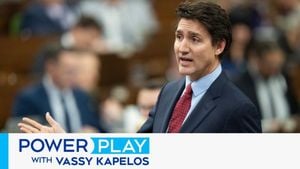Elon Musk, the tech billionaire and incoming advisor to President-elect Donald Trump, has set off ripples through the financial and regulatory landscapes with his call to "delete" the Consumer Financial Protection Bureau (CFPB). This agency, established after the 2008 financial meltdown to safeguard consumers from predatory financial practices, now finds itself under siege from Musk and his closely allied business advocates.
Musk's dramatic announcement came via his social media platform X, where he emphasized, "Delete CFPB. There are too many duplicative regulatory agencies." This simple yet provocative tweet aligns with Trump's plans to streamline federal operations through the newly proposed Department of Government Efficiency, headed by Musk himself and fellow entrepreneur Vivek Ramaswamy.
If anyone knows about the intricacies of government regulations, it’s Musk, who has made headlines for disrupting traditional industries with companies like Tesla and SpaceX. Little did the world know, many of those same industries have been at odds with the CFPB, which has historically clashed with Silicon Valley investors seeking to break through the banking industry with new innovations.
Following Musk's tweet, venture capitalist Marc Andreessen echoed sentiments on Joe Rogan's podcast, asserting the CFPB "terrorizes financial institutions" and hampers competition against major banks. Andreessen's own venture capital firm has faced scrutiny from the CFPB due to previous investments, like those in the payday lending company LendUp, which was penalized for deceptive practices.
Certainly, the CFPB's track record is dotted with controversies. Founded under the Dodd-Frank Act, its mission includes monitoring allegations of unfair, deceptive, or abusive practices by financial entities. Within its brief existence, the CFPB has amassed significant power, securing over $20.7 billion for consumers through its regulatory enforcement.
Yet, the agency isn't just facing criticism from Musk and his associates; it has continually been under fire from Republican lawmakers who argue it operates beyond the limits of accountability. This sentiment is encapsulated by conservative policy initiatives like Project 2025 from the Heritage Foundation, which argues for the bureau's total dismantlement.
These calls for dissolution raise substantial concerns for consumer advocates and regulatory experts. While Musk and allies argue for efficiency and reducing government oversight, industry critics warn of the potential chaos such elimination could deliver. Rutgers Law School professor David Noll warns of historical precedent showing how financial deregulation often precedes crises, stating, "The historical pattern is likely to lead to financial disaster."">
The CFPB was born from the ashes of the last economic downturn, created to prevent another day of reckoning like the one seen during the Great Recession. Its establishment was largely championed by Senator Elizabeth Warren, who has long argued for the necessity of such oversight to protect everyday Americans. With Musk’s recent remarks, all indications suggest the agency could face its biggest threat yet.
The stakes heighten considering the CFPB’s well-established role. Its funding structure, unique compared to most federal agencies, draws from the Federal Reserve rather than annual congressional appropriations, which provides it with some insulation from the machinations of partisan negotiations. A challenge to eliminate or restructure this agency would require legislation — and considerable bipartisan support — something far from guaranteed as partisan divides run high.
Should the CFPB be dismantled, experts anticipate dire outcomes, including renewed predatory lending, overwhelming burdens on consumers, and potentially destabilizing impacts across the housing market. Instituting such drastic changes could complicate lending significantly, leading to uncertainty not only for the institutions but for consumers who rely on these protections when seeking mortgages or loans.
Pundits from across the political spectrum reacted strongly to Musk’s bold claim and the broader Trump agenda, with various industry stakeholders voicing alarm at what they perceive as recklessly partisan politics threatening consumer protections. Critics argue the agency's eliminating could revert significant protections back to the hands of traditionally less-responsive financial regulators.
Despite the overwhelming focus on potential changes facing the CFPB, the agency continues to serve as a stopgap against many of the convoluted financial pitfalls consumers face today. It functions as one of the last lines of defense standing against the systemic issues swirling at the intersection of consumer lending, industry regulation, and corporate accountability.
Looking forward, all eyes will be on how this battle evolves within the political sphere — whether the anticipated legislative actions will materialize and the extent to which the agency's mandate might shrink or expand under the new administration. With Musk at the helm of efficiency measures, it remains to be seen how regulatory frameworks will shift, and if they will hinge more on corporate interests than consumer advocacy.



